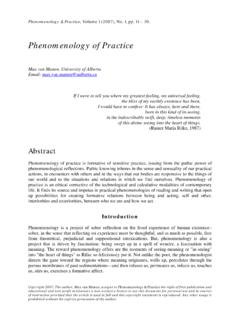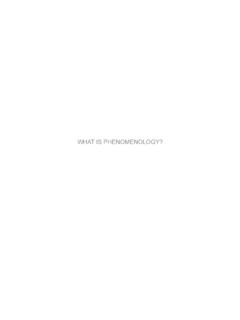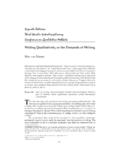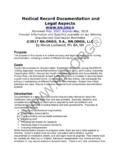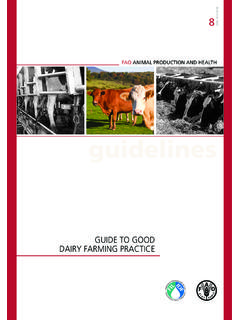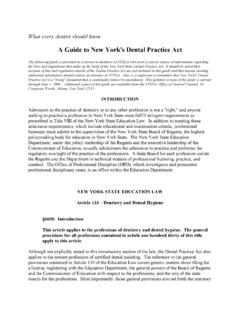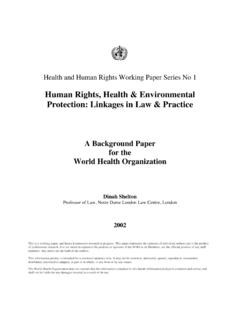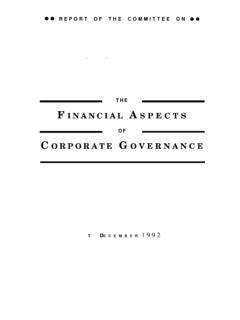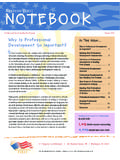Transcription of Phenomenology of Practice - maxvanmanen.com
1 Phenomenology & Practice , Volume 1 (2007), No. 1, pp. 11 30. Copyright 2007. The author, Max van Manen, assigns to Phenomenology & Practice the right of first publication and educational and non-profit institutions a non-exclusive license to use this document for personal use and in courses of instruction provided that the article is used in full and this copyright statement is reproduced. Any other usage is prohibited without the express permission of the author. Phenomenology of Practice Max van Manen, University of Alberta Email: If I were to tell you where my greatest feeling, my universal feeling, the bliss of my earthly existence has been, I would have to confess: It has always, here and there, been in this kind of in-seeing, in the indescribably swift, deep, timeless moments of this divine seeing into the heart of things. (Rainer Maria Rilke, 1987) Abstract Phenomenology of Practice is formative of sensitive Practice , issuing from the pathic power of phenomenological reflections.
2 Pathic knowing inheres in the sense and sensuality of our practical actions, in encounters with others and in the ways that our bodies are responsive to the things of our world and to the situations and relations in which we find ourselves. Phenomenology of Practice is an ethical corrective of the technological and calculative modalities of contemporary life. It finds its source and impetus in practical phenomenologies of reading and writing that open up possibilities for creating formative relations between being and acting, self and other, interiorities and exteriorities, between who we are and how we act. Introduction Phenomenology is a project of sober reflection on the lived experience of human existence sober, in the sense that reflecting on experience must be thoughtful, and as much as possible, free from theoretical, prejudicial and suppositional intoxications.
3 But, Phenomenology is also a project that is driven by fascination: being swept up in a spell of wonder, a fascination with meaning. The reward Phenomenology offers are the moments of seeing-meaning or "in-seeing" into "the heart of things" as Rilke so felicitously put it. Not unlike the poet, the phenomenologist directs the gaze toward the regions where meaning originates, wells up, percolates through the porous membranes of past sedimentations and then infuses us, permeates us, infects us, touches us, stirs us, exercises a formative affect. Max van Manen 13 In-seeing takes place in a thoughtful relation to what Heidegger (1985) calls "in-being" or our everyday being-involved-with the things of our world. In-being is the constitution of the sense of being, in which every particular mode of being finds its source and ground.
4 So, when Martin Heidegger says, "Knowing is a mode of being of in-being" then this means that every moment of practical acting and knowing always already takes place in a mode of being that he calls in-being (1985, p. 161). A Phenomenology that is sensitive to the lifeworld explores how our everyday involvements with our world are enriched by knowing as in-being. As teachers and researchers we are interested in the promise that Phenomenology can make to Practice . But Heidegger warns that Phenomenology "never makes things easier, but only more difficult" (2000, p. 12). He agrees with those who feel that Phenomenology lacks effectiveness or utility if one hopes to do something practically useful with it: "Nothing comes" of philosophy; "you can't do anything with it." These two turns of phrase, which are especially current among teachers and researchers in the sciences, express observations that have their indisputable correctness.
5 [It] consists in the prejudice that one can evaluate philosophy according to everyday standards that one would otherwise employ to judge the utility of bicycles or the effectiveness of mineral baths. (2000, p. 13) The practicality of a Phenomenology of Practice should not be sought in instrumental action, efficiency or technical efficacy. And yet, that does not mean that Phenomenology cannot have practical value. It is entirely correct and completely in order to say, "You can't do anything with philosophy." The only mistake is to believe that with this, the judgment concerning philosophy is at an end. For a little epilogue arises in the form of a counter-question: even if we can't do anything with it, may not philosophy in the end do something with us, provided that we engage ourselves with it?
6 (2000, p. 13; emphasis in original) In some sense all Phenomenology is oriented to Practice the Practice of living. But from the perspective of our pragmatic and ethical concerns we have a special interest in Phenomenology . We have questions of how to act in everyday situations and relations. This pragmatic concern I will call the " Phenomenology of Practice ." Thus, we wish to explore how a Phenomenology of Practice may speak to our personal and professional lives. Now, in asking whether Phenomenology may do something with us Heidegger hints at the formative value of Phenomenology . In doing phenomenological research, through the reflective methods of writing, the aim is not to create technical intellectual tools or prescriptive models for telling us what to do or how to do something. Rather, a Phenomenology of Practice aims to open up possibilities for creating formative relations between being and acting, between who we are and how we act, between thoughtfulness and tact.
7 14 Phenomenology & Practice Practice Theory It may be helpful to remind ourselves that the word " Practice " has long been used in contrast with the term "theory." Valuing the theoretical life over the life of Practice hints at high commitment to truth and contemplating the good life. Thus, theory can mean a rebuttal of Practice , but it can also be seen in the service of Practice , following Practice , or as the essence of Practice itself. In his "Praise of Theory" Hans-Georg Gadamer (1998) notes that theoria in its original Greek sense of contemplatio was conducted in a broader context of life and thus was also a way of comporting oneself. He says, it is a "'being present' in the lovely double sense that means that the person is not only present but completely present" (1998, p.)
8 31). Gadamer questions the justification of the oppositional contrast between theory and Practice . He asks whether it is perhaps not so much theory but Practice itself that points to the sources of meaning of our lives: But what has happened to our praise of theory, then? Has it become a praise of Practice ? Just as the individual who needs relevant knowledge must constantly reintegrate theoretical knowledge into the practical knowledge of his everyday life, so also a culture based on science cannot survive unless rationalizing the apparatus of civilization is not an end in itself, but makes possible a life to which one can say "yes." In the end all Practice suggests what points beyond it (Gadamer 1998, pp. 35-36). If we accept Gadamer's suggestion of praise of theory as praise of Practice then some provocative questions present themselves.
9 What then remains of theory in an age where only few are still willing to sing its praises? An example of a provocative questioning of the significance of theory is the book that contains a series of interviews with prominent scholars such as Jacques Derrida, Frank Kermode, Christopher Norris, and Toril Moi (Payne & Schad, 2003). The title of the book was chosen first of all to indicate that the period of high theory appears to have passed and now it may be time to ask again about the relation of theory to life. The conjunction "after" in "life after theory" may be understood in different ways. "After" may simply mean the chronology of life following theory, referring to new forms of thought or Practice now that theory has vanished, or "after" may suggest that theory has conditioned life, or, vice versa, that life is now after theory in an entirely different sense of that term.
10 In the opening dialogue of , Derrida offers a surprising but provocative thesis of how he sees the Practice of his own life in relation to his writing. He says, I confess that everything I oppose, so to speak, in my texts, everything that I deconstruct presence, voice, living, voice and so on is exactly what I am after in life. I love the voice, I love presence, I love ..; there is no love, no desire without it. So, I'm constantly denying, so to speak, in my life what I'm saying in my books or my teaching .. [In my writing there is] a Necessity which compels me to say that there is no immediate presence, compels me to deconstruct .. Max van Manen 15 Nevertheless, in my life, I do the opposite. I live as if, as if it were possible .. somehow to be present with voice, or vocal presence.
